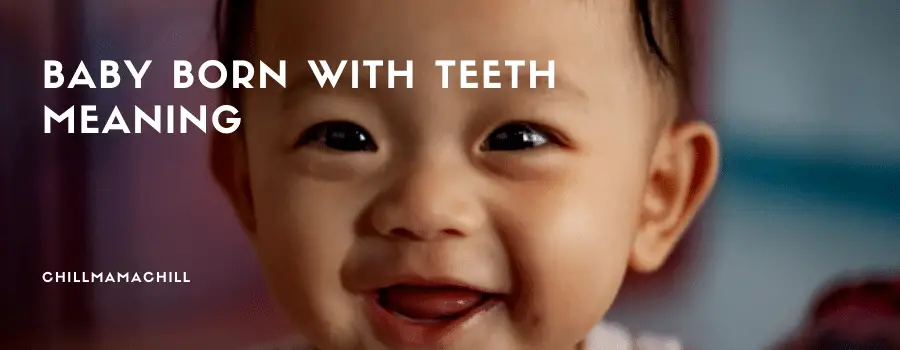Your little bundle of joy arrives ten fingers, ten toes, two beautiful eyes. And then you notice it – there’s a tooth in your newborn’s mouth! It is a natural part of development for babies to grow teeth during the first year of life. But what is the ‘baby born with teeth meaning’ in today’s world?
Any teeth present at birth are known as natal teeth. They may also appear within 30 days post-delivery, making them neonatal teeth. Although this is a rare anomaly, it continues to be associated with various superstitions. The truth is, it is a medical condition that leads to suckling problems or causes the baby discomfort.
Many new parents are worried when their newborn is born with teeth or grows soon after birth. What does it mean, and what should you do? I have all the answers you need. Read on as I separate fact from myth.
Why Some Babies Are Born with Teeth: The Facts
Since the 1930s, doctors have been fascinated with natal and neonatal teeth. This has prompted numerous studies into the topic that aim to debunk any misconceptions about a baby born with teeth meaning. This is attributed partially to the fact that scientific research cannot pinpoint the exact cause of babies born with teeth.

Studies are ongoing, but what we know so far is adequate. I can comfortably tell you that if your baby comes out of the womb spotting exposed enamel, you have nothing to worry about. 1 in every 2000 infants is born with a natal tooth or grows one within the first month.
But don’t get it wrong – even though there isn’t a dead-on reason why teeth are present in neonates, some medical illnesses are believed to increase their occurrence. Conditions that have been proved to cause this include:
- Cleft palate
- Sotos syndrome – A disorder that’s characterized by a premature eruption of teeth in children.
- Ellis-van Creveld syndrome (chondroectodermal dysplasia) – Causes skeletal abnormalities that may be indicated by teeth present at birth.
- Pierre-Robin syndrome
- Hallermann-Streiff syndrome
- Jadassohn-Lewandowski syndrome (Pachyonychia congenita)
There are no proven differences based on gender. Both male and female infants are equally-susceptible to developing natal teeth.
Perhaps the most evident reason some babies are born with teeth is a genetic predisposition. Have you ever heard the adage that the apple doesn’t fall far from the tree? So if teeth were present when you were born, chances are some of your babies will.
Baby Born with Teeth Meaning: The Myths
Babies come with many surprises, but being born with teeth is never expected. Due to the condition’s rarity, different societies have developed varying superstitions to explain the phenomenon. Here are some interesting ones.
- Since Napoleon the Great had natal teeth in France, babies born with teeth are predicted to become leaders and conquerors. Italy and England share the same view.
- In India, China, and Poland, such occurrences are considered a bad omen.
- Malaysians take it as a herald for good fortune.
- In some rural parts of Africa, it is seen as an unholy sign and the mark of the devil.
How to Care for Natal Teeth
Although most pediatric dentists recommend removal as treatment, sometimes they will leave the teeth intact. In the same way you brush your teeth, you must have the baby’s oral hygiene in mind. Luckily, you don’t need any sophisticated tools. All you need is a clean piece of cloth and warm water.
To clean the baby’s teeth:
- Dip the cloth into the water and wring out the excess
- Wipe the gums and teeth with a wet, clean towel
- Do this every day
Ensure you carefully inspect tot’s gums and tongue frequently to ensure that the teeth are not injuring them in any way. If you detect any wounds or signs of agitation, consult a doctor for expert advice.
Should You Remove Natal Teeth?
So now that your little bundle has natal teeth, what is the next step? Typically, if you had a hospital birth, the doctors will notice any oral variations and suggest further evaluation or prescribe treatment.

A 2012 study assessed the case of a 2-day old infant who was admitted due to the presence of natal teeth. The crowns of two incisors were protruding from the bottom gum. Upon close inspection, the pediatric dentist noted that the teeth appeared normal in any aspect except for one thing: they had no roots. They also seemed to cause some level of discomfort to the baby. Treatment was prescribed, and the teeth were extracted.
It was established that the presence of teeth in infants might pose several challenges, such as:
- Increased risk of breathing in a dislodged tooth leading to aspiration. Natal teeth often have no roots and are held to the gum by soft tissue.
- Problems feeding due to pain
- Injury to baby gums and tongue
- Ulceration to the nipple of the mother and interference with breastfeeding
A pediatric dentist will perform an x-ray to ascertain adequate root structure to support normal growth. If there’s a root and none of the above issues, the tooth can be left safely in place. But when there are problems, they are extracted.
If a natal tooth becomes loose and dislodges, do not reattach it. You may damage the tender gums with long-term effects affecting their oral health.
Is Being Born with Teeth Hereditary?
People have been telling you that you were born with a tooth. Does this mean that your babies will be the same way? Well, it has been established that there is a genetic connection to the prevalence of natal and neonatal teeth.
Approximately 60% of cases indicate a favorable prognosis with an autosomal dominant pattern. This means that there tends to be a hereditary predisposition to grow natal teeth – half the children of an affected individual are affected.
The Bottom Line
Newborns born with teeth are rare. But when they are detected, early diagnosis and adequate treatment are critical. If a baby born with teeth meaning is skewed in your community, ensure you seek medical advice before you trust and follow any traditional remedies. You may end up harming your little munchkin. The doctor will determine whether to pull out or retain the teeth – whatever is in the best interest of the baby and you.

I’m Cathrine and I’m a 39-year-old mother of 3 from Utica, New York. And I’m extremely happy you’ve come to visit my hide-out on the web. Here I post about everything related to family-life and usually it will involve babies and lessons I’ve learned over the years from experts, friends, and my own mistakes. So hopefully you will find what i write fun and informational!


